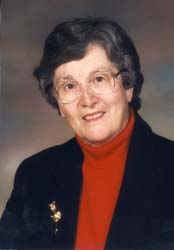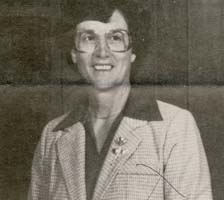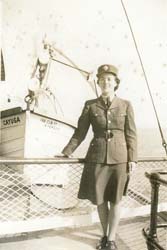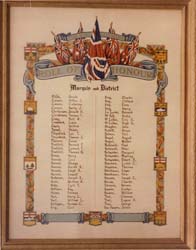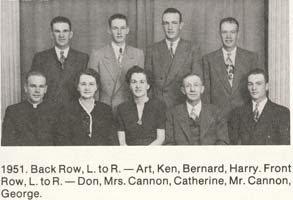Wall of Service
Column
17
Row
26
My elementary schooling I obtained at St. Mark's School and secondary schooling at the Marquis Public School. Later education includes an Honours B.A. from the U. of S. in Saskatoon and an M.A. from the University of Toronto. I loved all my teachers, however, on I must mention. Had it not been for the dedication of Mr. M.G. Sillery who taught us Grade 12 when he was hired to teach only up to Grade 11, many of us in the Marquis district would not have graduated from high school. After attending Normal School in Regina and after teaching three years, I enlisted in the R.C.A.F. (W.D.). I experienced three years of service as a clerk accountant which included time overseas. Returning to civilian life in 1946 I taught for a year in the Moose Jaw area and then took a business course in Calgary where I lived until 1951 when Father Kuckartz, OMI, asked me to help him in the founding of a religious community, the Sisters of Mission Service, a pioneer effort to update religious life. When my role as co-founder seemed accomplished, I answered a call by the London, Ontario diocese in 1969, to help in the founding of a Christian renewal centre. After five years there, I moved on to North Bay, Ontario, to teach at Scollard Hall, an all boys' high school, where I was one of the first women teachers. Being like my mother, a survivor, I am still here.
Charles Cannon Family
By Catherine Cannon
The history of the Cannon family of Marquis is so closely linked with that of the LaLonde family that I cannot think of one without the other.
My dad, Charles, was born in Hitchin, Hertfordshire, England on November 20, 1891 - the youngest in a family of five. At the age of sixteen the spirit of adventure overtook him and he set sail for Canada where his eldest brother George, ten years his senior, was homesteading near Kindersley, Saskatchewan. At one point Dad worked as a farm hand just south of Saskatoon; at another he worked for James S. LaLonde of Marquis; later he homesteaded near Kindersley.
The spirit of adventure must have been contagious in the Cannon family, for in 1912, GEORGE and CHARLIE were paid a visit by their sister Lizzie. She had planned only to stay a short while before returning to England, but she met Frank LaLonde whom she married in April of 1913. There was obviously a magnetic attraction between the Lalondes and the Cannons for Charlie and Lucy LaLonde, Frank's sister, were married on February 12, 1918. They were married at St. John's Church, Marquis, the LaLonde home parish, but lived in the Kindersley district for the first year or two. Their first child, HARRY, was born in Moose Jaw in late 1919. I was born at the Providence Hospital also, as were my next brothers: ARTHUR, DONALD, BERNARD and GEORGE. Only KENNETH, my youngest brother, was born in Tuxford during the 'Dirty Thirties'.
Mom's brother, Harry LaLonde, who farmed the west half of Section 21, township 19, range 27, west of the second meridian, died in 1918. About 1920 Mom and Dad moved to Marquis, renting Uncle Harry's land from his widow Ethel who later married Bill Meagher of Marquis and lived in Denver, Colorado.
It was on that plot of land in Saskatchewan, one mile east of Marquis, just North of the CPR line, that our parents lived out the rest of their lives and for the seven of us, it is still "the home place". Cancer claimed both out parents - Dad in October 1952 at the age of 60; Mom in September of 1957 at the age of 63. However before their deaths they were able to realize their dream of owning the land.
As I recall growing up in Saskatchewan during the Dirty '30s, the railway tracks loom large. We walked the rail to school; we told the time of day by the passenger trains; it was a game to guess the number of box cars on the freight trains or to speculate as to how many fellows would be "riding the rods"; and of that number how many would stop off at our place for a meal. These visitors - "hobos" in the parlance of the day - were part and parcel of our life; we had as many as sixteen in a week. I always admired my mother's homespun philosophy concerning them. She never wanted them to feel that they were beggars, but rather that they earned their meal. If they were strapping young men, it was always "lucky you came along as I need a pail of water" or "some wood chopped". An older man was urged to tell her the news that she had no other way of learning. We may not have had that much in the way of worldly wealth, but what we had - Mom and Dad impressed on us - was meant to be shared and shared graciously; our transient visitors always sat at the table at Dad's right hand. To Mom the plight of those unemployed could one day be the plight of any of her six sons.
Mom had come to Canada from Minnesota in 1903 at the age of ten and was definitely a survivor, and she knew how much the pioneers depended on one another. Giving and receiving were all a part of the pioneer spirit. She gave what she had to those riding the rods or any others who needed a helping hand, but she also accepted the help offered by other fellow Canadians from the east. (How I remember the days coming home from school, catching a waft of a pungent odor and speculating, "Mom is either making soap or cooking that Newfoundland cod fish." That says something of how we prairie kids viewed that Maritime gift - had we had our way those dried slabs of fish would have all ended up as snowshoes!)
Living on a farm definitely had its advantages. Although we did not have the infinite variety of foodstuffs that grace our tables today, we certainly never wanted for the bare essentials. True, dessert was a Sunday treat and was usually rice or bread pudding, rhubarb sauce, homemade ice cream in the winter and with luck in summer, Saskatoon berries. And there was the luxury of butter or cream on everything! What the farm could not supply, we bartered for at Swann's Store. I recall getting 60 cents- worth of supplies for a 15 dozen crate of eggs. The usual things "brought" at the store were sugar, tea coffee and of course Dad's tin of Wills' tobacco and Chantecler cigarette papers.
Food was always ample; it was money that we saw very little of. Bernard remembers the day Dad sold Babe, our four year old horse, for 145$. We all sat around the table taking turns counting the fourteen crisp 10-dollar bills and the five! I recall saving my pennies for Mom's Christmas present, something she really needed - a ten-cent bottle of ink. (I had seen her use laundry bluing to write a letter. "Ingenuity" was Mom's middle name.)
Even though Marquis was only a hamlet, we could boast of a medical doctor and our family gave him/her share of business. The fall of 1937 was typical. At one and the same time, Dad was home with what could have been typhoid fever, I was "dying" in the hospital with streptococcus meningitis, and George was home with a swollen hand that puzzled Dr. Steele. It needed immediate attention to check the infection so she operated on him on the dining room table; later it was necessary to amputate a finger. I was told that I made medical history - the first ever in Canada to recover from that brand of meningitis. The next few years whenever I met with an eye specialist, a dentist or medical staff in Moose Jaw or Regina, I was often confronted with "Are you the 220 case from the providence?" (My room number was 220.)
Recreation was always the homemade variety. The highlight of winter was going to Grandma's (LaLonde) for Christmas - there was always 30 or 40 of us. A summer highlight was Dad's piling us kinds into a wagon or Bennett buggy and taking us for a week's camping at Lovering's lake. I loved the lake - it seemed to charm Dad into being the most patient man in the world. He could sit for hours with a fishing line in his hand and it did not seem to matter whether he caught anything or not. Our week at the lake was also afforded Mom, back at the farm, her only holiday.
It was a red-letter day at our house the day we got our first radio. In order to get the piece of our philco, we kids raked the fields where the stooks had stood, then threshed the gleanings. The radio changed our lifestyle somewhat. Monday nights, supper was early so we could finish the chores before "Lux Theater" at 7. Other programs that were family fare were "Gang Buster", "Just supposing", "Amos ‘n Andy", and of course, Foster and Hewitt and "Hockey Night in Canada" on Saturday nights.
The early 1940s saw the older ones of the family leaving the nest. Mom and Dad must have felt lonely, as it wasn't long before they decided to take in a foster child, Bob Nagel.
